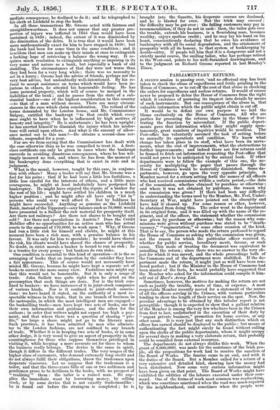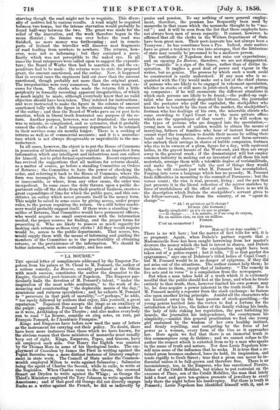PARLIAMENTARY RETURNS.
A SECOND session is passing over,'Iand no effectual step has been taken to check the abuse of superfluous and futile printing in the House of Commons or to cut off the root of that abuse in checking the orders for superfluous and useless returns. It would of course never be proposed to debar the House of Commons from the right which it exercises of pursuing its inquest into details by means of such instruments. But one consequence of the abuse is, that valuable information which the public might obtain is cut off. It would be to defeat our own purpose if we laid the blame exclusively on the House of Commons. All who are parties for procuring the returns share in the blame of frus- trating the function by misconduct. If the public depart- ments gave that information which they might supply spon- taneously, great numbers of inquiries wouM be needless. The Post-office has voluntarily assumed the task of setting before us annually its operations and condition. We know what change has taken place in its staff, what have been its move- ments, what the cost of improvements, what the obstructions to further improvements ; and indeed there are few returns could be framed to fetch out information respecting the Post-office that would not prove to be anticipated by the annual book. If other departments were to follow the example of this one the ne- cessity for multiplying the paper that passes through the House of Contmons would be materially diminished. Some de- partments, however, go upon the very opposite principle. A Member moved for a return setting forth the names of all officers who had received commissions within a certain period,—the date of the commission, whether obtained by purchase or otherwise ; and where it was not obtained by purchase the reason why the commission was given? If there had been any difficulty in understanding the terms used by the Member Mx. Peel, Under- Secretary at War, might have pointed out the obscurity and have had it' elearZd up. For some reason or other, however, be abstained from doing this. The order went to the department in its origitio.Pform, and it was filled up with the name of the re- giment, and of the officer, the statement whether the commission was given by purchase or otherwise ; but the reason why com- missions were given without purchase was stated to be "death- vacancy," " augmentation," or some other occasion of the kind. That is to say' the person who made the return professed to regard the House of Commons as asking why the commission was given, not the reason for which the particular officer received it, whether for public service' hereditary merit, favour, or such cause. This mode of treating the document was equivalent to annulling the return ; since there was no answer to the very ob- ject for which it was moved, and the whole proceedings both of the Commons and of the department were stultified. If the de- partment made the return, it might just as well have been ren- dered perfect ; but if the Miniater in the House of Commons had been master of the facts, he would probably have suggested that the Member who asked for the information could compile it him- self out of Hart's Army List. Sometimes, however, the motives for making the return are not such as justify the trouble, waste of time' or expense. A. most respectable Member recently moved for a statement of the names of all the officers serving in the Crimea, with various particulars tending to show the length of their service on the spot. Now, the peculiar advantage to be obtained by this tabular report is not perceptible ; though it is expected to show that a gallant relative of the Member is among the very few who have been in the Crimea from first to last, undisturbed in the execution of their duty by "urgent private business," promotion for home service, or any
other cause. It is very just that any such distinction which an officer has earned should be displayed to the public ; but means of authenticating the fact might surely be found without calling upon the clerks of the public departments, whom it might occupy for several days in making a very elaborate return, that probably could be compiled from external. resources. The departments do not always dislike this work. When the
grant of 8,000,000/. was made for the assistance of the Irish peo- ple, all the propositions for work had to receive the sanction of the Board of Works. The famine came to an end, and with it the duties of the Board. But a Member called for a return of a very extensive and detailed kind, showing how the money had been distributed. Now some very curious information might have been given on that point. The Board of Works might have exhibited the oddities of the labours executed under their oom.- mand. One of the forms of work most common was roadmalcing, which was sometimes sanctioned when the road was much required by the neighbourhood, and sometimes when the people wore starving though the road might not be so -requisite. This diver- sity of motives led to curious results. A road might be required between -two towns, but the intense starvation would probably be found half-way between the two. The grant was made for the relief of the starvation and the work therefore began in the mean district ; the famine was over before the road was finished, no more money was forthcoming ; and in remote parts of Ireland the traveller will discover neat fragments -of road leading from nowhere to nowhere. The returns, how- ever, were not so informing but they contained a pecu- liarity which was not perceptible to the naked eye. In all easesthe local ratepayers were called upon to suggest the expendi- ture; the Board of Works then had to sanction it, and the ex- penditure had to be made : the returns were to state the proposed grant, the amount sanctioned, and the outlay. Now, it happened that in several cases the engineers laid out more than the amount sanctioned, though probably not more than the original grant. The irregularities were very numerous, but there were many ex- cuses for them. The clerks who made the returns felt a little perplexity in formally recording apparent irregularities, of which so much might be made although everybody knew that no valid objection should have been-taken. They in for instructions ; .and were instructed to make the figure 11 L the column of amount sanctioned tally with the figure in the column stating the amount of the outlay ; and thus the Board of Works gave an ex post facto sanction, which in literal truth frustrated one purpose of the re- turn. Another purpose, however, was not frustrated : the return was so minute, so complicated, and so extensive, that it probably caused the clerks of a half temporary department to be retained in their services some six months longer. There is a cooking of returns as well as of commercial accounts ; and it is a manufac- ture which is not always disagreeable or unprofitable to the ma- nufacturer.
In all eases, however, the object is to put the House of Commons insion of information ; not to reprint in an imperfect form information which any intelligent and industrious man can collect for himself, nor to print formal equivocations. Recent experience has revived the suggestions that all motions for returns should, as a matter of course, go before a standing Committee on Orders of Returns ; the Committee to have the power of checking the order, and referring it back to the House of Commons, where the form was incomplete, the information itself already attainable, or inaccessible, or where, from any other cause, the order was inexpedient. In some eases the duty thrown apon a public de- partment calls off the clerks from their practical hosiness, creates a great expenditure of time for which the public pays, and this con- stitutes an outlay which never presents itself in the money form. This might be saved in some cases by giving access' under proper rules, to the person requiring the return. Or a still better machi- nery would probably suggest itself. If there were a standing Com- mittee of Returns, that Committee would have permanent officers, who would acquire no small conversance with the information needed, the proper sources for finding, and the proper forms for presenting it. Who are likely to possess so much capacity for making such returns as these very clerks ? All they would require would be, access to the public departments. That access, too, Would supply them with the means of informing and guiding the members of the Committee as to the practicability of obtaining returns or the preexistence of the information. We should be better informed, with more certainty, and less cost.



































 Previous page
Previous page